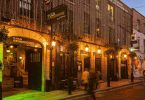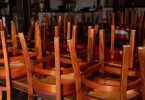Nightclubs and late bars – the problems (the solutions?)
Pat Nolan: Nightclubs and late-night pubs: I don’t think anyone has heard of any pending legislation yet the Special Exemption Order is still a huge bugbear for anyone involved. Do you think the Government is going to bring its cost down or is it a cash cow?
Eddie Fitzgerald: I can’t see them bringing it down. Somewhere there’s need at a political level for the new Government to take on this licensing issue, see that people are better-off drinking late in bars and nightclubs than they are drinking cheap Tesco wine and vodka in their houses which seems to be the norm now, especially with younger people.
Oliver Hughes: It’s not good for the people and any time you see a complaint about binge-drinking, it refers back to pubs and nightclubs. It’s never about Tesco and cheap booze. I hear there’s an anti-alcohol lobby building up too; it’s all anti-pubs and nightclubs and where’s the drinking done now? It’s done out of supermarkets at cheap prices. It needs a political will there somewhere to take it on.
Brendan Flynn: Maybe let’s allow the pubs open late without charging them €410 and a nightclub gets a yearly licence; it was proposed by Barry [O’Sullivan, INIA Chief Executive] with the Nightclub Association. I thought from a pub point-of-view that that made sense. Let the nightclubs open late and let the pubs open later – maybe not till 2.30; bring it back a little bit. People always want to go to a pub before a nightclub anyway.
OH: Wearing a different hat as Chairman of the Nightclubs Association… Barry had a meeting with the Minister and it was most illuminating. Prior to this we employed an economic consultant and discussed various things with him. He said to me, “You’ve got to understand the way politicians look at things. They are two-line people”. You can prepare all the reports and all the stats you want… For instance, the reason why excise duty went down two years ago – there were all the reports done about cross-Border traffic, about money being lost and highest-priced alcohol in Europe. He said it was utterly lost on all the politicians. The only reason it came down, he said, was because of a Day of Action when public servants were all supposed to go on strike. And what happened was the road to Newry got jammed because they all went up to buy cheap booze. It’s a bit like the Ladybird books – you’ve got to give it to politicians in pictures….
What actually happened was, Barry had a meeting with a certain minister who shall remain nameless and it was pointed out that Tesco in ClareHall sells more booze in a week than all the nightclubs in Dublin put together. It was pointed out that if a nightclub is open six nights a week, the Government get €125,000 a year in SEOs from that one individual establishment. Tesco in ClareHall pays €1,500 a year to sell more units of alcohol than all the nightclubs in Dublin added together. The response was: “But there’s not many Tescos in Ireland, is there?”. It’s very frightening.
Michael Wright: Also these people don’t go to nightclubs. They don’t live in the same world that we live in. And they don’t see things the same way as we see them
PN: But they have kids that go to clubs….
MW: … But all they hear is horror stories. We get nights where we could have up to 2,500 people and I’ll hear of one situation that might have happened. You won’t hear about the 2,499 that had a great flawless night. Very often that one situation is the story that gets told.
Tom Cleary: Temple bar was getting a fierce time in the press: stags and hens, dirty, urine. About eight or nine years ago we set up our festival on this weekend. We got one message through: when we set up TASQ, we got the guys in it to understand that it was the overall area we were trying to build up, not just outside your own door.
BF: You mention that kids go to nightclubs. If they’re girls, they’re in some girl’s house; they’re drinking the cheap Tesco Bacardi, wine or whatever. If they’re lads, they’re playing pool in somebody’s house and they’re heading to a nightclub, getting there about half-twelve or later. They’re probably not paying an admission price. Admission has got really soft around town and because they’ve had a drank before coming in they’re not spending as much money across the bar. So the core profitability has come down, the spend per head is not there. As an economic model we need to stand back and look at it. We can’t afford to be getting the Special Exemptions. We do our costs, our Special Exemptions and our DJ and our extra security and you need to have certain numbers before you break even. A lot of people round town don’t actually do the numbers.
MW: In effect we’ve become dance-floors for Tesco. We have all the costs of security, licence, maintenance and insurance…
BF: … And all the responsibility has fallen on us because these young people drink heavily at home with no supervision, no measures… and then they pitch up on your door. Some are not too drunk to get in, then they become your responsibility. I think a reduction would be welcome as a late licence is excessive. But I would prefer to see an hour extended onto the time from half-two to half-three. If the hour was extended we would have more time to pay these huge costs. I think people should have a choice of going to a late-bar or nightclub.
PN: Yes, but what I’m saying is, at what point does the licensing door close on the proceedings? Nightclubs don’t have much of a window from half-two to half-four when the pubs are closing at half-two?
EF: You’re suggesting that the nightclubs get extra time? I don’t think that would be fair. I think everyone should be on the same pitch. The customer should have a choice, whether it be entertainment or music for tourism like Temple Bar.
MW: I think you have to understand that the licence might be the same but they’re two completely different markets. A person often knows on a Monday or Tuesday that they’re going to a club on Saturday night. They know what they’re going to wear and go in groups of friends, not ones and twos; they’re completely different markets.
The person who goes to a late bar is very different. Sometimes, there’s a cross-over.
You shouldn’t discriminate between one customer and another. It should be the same playing field for everybody.
PN: So it’s down to the clubs?
EF: For me, they should be given the choice, they shouldn’t be told that there’s only a nightclub. It’s not everyone’s cup of tea.
MW: I think the defining line is dancing, actually. People go to nightclubs very often to dance or to be around that type of atmosphere. Late bars are more about later drinking.
BF: I disagree. It has got very grey and I think that’s a very good point when you said ‘What’s a nightclub?’. There were pubs, there were late-night bars and there were nightclubs and now I think there is something in between late-night bars and nightclubs; there s another stratum there. It’s one thing us sitting in this room in the trade trying to define it, but we have people – and they’re going out for dinner or maybe they’re just going to the pub or drinking in the house and going out late – and they don’t think, “I have to make a strategic decision here. Am I going to a late-night bar or am I going to a night club?”. They’re going to whatever brand they’re going to. They’re not as definitive as we’re trying to be and then we’re trying to be definitive in licensing terms, to say they should be different.
PN: Tom, how does that work with you? Are you happy that there are nightclubs around you?
TC: I think it goes back to the fact that the late-bar and the nightclub are going to have to get some definition of what a nightclub is. As Michael said, there are late-night bars calling themselves nightclubs. I don’t know if it’s a dance thing, but they’re calling it a special event.
OH: As we know the licensing laws are very old. At a recent discussion in the Law Society people were saying that you cannot have a licence superior to the 7-Day Publican’s licence.
The word ‘superior’ is so emotive. But if that’s the case, what’s that publican doing with his restaurant licence, staying open ‘till two in the morning without paying his €400 SEO? What’s anyone doing paying for an SEO if it isn’t any different to a 7-Day Publican’s licence? What licence does Leeson Street operate under to operate to half-six, seven o’clock in the morning, that’s not superior to the 7-Day licence – or Harcourt Street? If I was a nightclub down the country, what would really get up my nose would be paying €400 for the privilege of opening late. And then when your staff clean up they all go off to a local late bar and have a few pints because the Gardai don’t do their job.
You either have laws or you don’t have laws. Nobody in the country can open beyond half-two.. In ways, you should just have a free-for-all because what we have is an unofficial free-for-all. So the good guys who abide by the law are not benefiting. Maybe there should be no laws. They’re not being enforced.
MW: I think a big issue for the Gardai is they don’t know walking down the street what is a bar, what is a restaurant, what is a late-bar, what is a nightclub and that’s no fault of their own. We don’t display tags of what we are. There should be a system in place where there’s a sign in your window that clearly states that you’ve a late licence and your exemptions should be printed in the window for every month.
OH: That is one of the proposals from the Nightclub Association.
EF: It’s like a car tax. If your car is taxed you have a disc in the window. And the Gardai can look in the window and know your car is taxed.
MW: The problem is the time is half-twelve and a lot of guys will push it ‘till a quarter-past, twenty-past one and get away with it. The guy who’s paying for the SEO is getting only an hour more than the fellow who’s chancing his arm. The cost is huge.
PN: Isn’t that the crux of the matter?
MW: Yes. It works out at €1,000 with PPI, DJs, security etc so he’s at a €1,000 disadvantage to the guy next door. And if you do that two nights a week, that adds up to a €100,000 disadvantage.
OH: Maybe we don’t need a definition of dancefloors – just pay your money and you go to a certain time. Three tiers of licence: a regular licence with Friday night at half-twelve, a half-one one and a half-three one.
BF: There’s an assumption that everyone wants to go as late as they can. In my business I like to go to a certain time and I don’t want these people coming up to the door after a certain time and having to look after them, baby-sitting them ‘till 4am. That’s my business and my decision and the guys round the table here might have a different view.
I need to be able to offer my customers what I want. Maybe some places want to go ‘till six in the morning and with a tourism hat on I believe we should have such places; maybe there’s only a demand to have three or four such places in the city and let those who think there’s a commercial opportunity in that go for it. And pay the extra.
PN:Tom would you go for that?
TC: Yes, something like that is needed in an international city, even for tourism we have to go later; we need proper nightclubs. Again it’s back to what is the nightclub and how is that legislated? I have no problem going to six o’clock and you can decide yourself what time you want to close at, like in a regular pub
PN: So do away with the nightclub…or late night-pub definitions or anything like that?
OH: Who’s sitting down to a meal at half-one??
MW: It should come down to the licence. I wouldn’t want to serve any later than half-three. My bars by twenty-past two are getting quiet and by half-two, twenty-to-three, finished. It’s usually in the VIP area, a small area within the club, that people want to drink later.
OH: This idea of the Superior Licence, the 7-Day Publican’s licence, are publicans some of the most lack-of-forward-thinking groups in society? Things move all the time. But the licensing laws go back to 1908. The Dance Hall act is 1924. Things move, trends change.
There was an article by Tom Dooley – I though it was very good – where he said ‘I’m very sorry pubs are closing, but maybe publicans should give the public what they want’.
A lot of publicans are not giving the people what they want. We’ve recently opened a couple of tapas bars because we saw there was a market for grazing food and it’s open on a €200 wine licence. And they are tippling away very nicely as opposed to a publican standing there and going “MY Superior Licence” – and there’s nobody coming into his place.
PN: I don’t want to leave without discussing supermarkets and off-licences.
MW: When the licensing laws were being written in 1800-and-whatever, did they imagine that there would be a building like ClareHall selling drink below-cost?
That’s how out-of-touch they are; it’s like using a pidgeon to send a message when now we have Facebook.
OH: We touched there on the Tesco phenomenon. I think one of the reasons why the Government is very unstructured about where they want to go here is quite simple. Back in the 1950s the economy was in such a bad state, Guinness’s had to lend the Government money to pay the civil service wage bill. Now Guinness is owned by Diageo. Tesco owns Ireland
PN: In the UK it’s the same….
OH: You don’t have to invade countries any more. You own them by different methods. The say Apple has €120 billion on deposit in funds and we have to get bailed out every year because we have an annual civil service and social welfare wage bill of €50 billion with an income of €32 billion.
PN: Below-cost selling?
OH: There has to be a minimum price per unit of alcohol. Below-cost selling is a straight no. Alcohol is the only thing that is being sold below-cost.
TC: It came up at the LVA with [Chief Executive] Donall O’Keefe. At the moment we’re 5:1, pub to off-licence. A bottle of Heineken is a €uro in Tesco. It’s roughly €5 in a pub. We’re one of the lowest multiples in the world. In Germany it’s 8:1, in America it’s 9:1 and in France it’s 10-1. This is here to stay so forget about them and improve the offerings with music etc; we’re never going to beat them on price.
OH: I think we have to recognise that within our genes, we have a predilection towards alcohol. Look at the difference between wine and beer; historically beer was brewed when the barley crop came in; it only lasted six to eight weeks and it was literally ‘feast or famine’. Everyone got absolutely blind drunk and then there was no beer for the rest of the year.
Wine operates totally differently. You can store wine so if you draw a line between wine-making and beer-making countries — it hits in at the top of France and goes right across Spain — above that line there’s a predilection to alcohol.
Below it they are wine-orientated and there isn’t such a disposition to alcohol.
Think of a Frenchman sitting in a restaurant with a nice bottle of wine. He’s not going to say: “You know, if I went to the ‘offie’, I could buy that for a fifth of the price and really get hammered”!
The Irish will go “Jaze! I’ve just paid €5 for a bottle of beer! I could have got five in Tescos and be hammered by now”.
PN: So the on-trade has to raise its game?
BF: Yes definitely! People aren’t going to pubs to drink but for entertainment. If you want to drink you can do it at home: they’ll deliver it.
When we grew up you went to pubs because that was how you got integrated into society, you met your peers. All that is gone. We have to look at what the pub is now and ask, “Why would people want to go to my pub?”…..
MW: … And it has to be about the comfort, the lighting, the experience and the entertainment starts with the barman saying “Hello” and welcoming you, having a bit of craic with you.
EF: Pre-loading and home-drinking is a social disaster for the future. I think the Government will have to take a very tough line. People will always come to the pub because of the social aspect. I still don’t believe that Facebook is as good as the pub. Our staff now are better-trained, more focused towards customer-needs. As publicans we’re better-trained: it’s a tougher business. The Baggot Inn is about fun and enjoyment. Any pub I’ll ever be involved in will be the same.
TC: As Eddie says, the pubs need to lift their offering. Some of the pubs you go into are horrific. It upsets me to go into them. That’s the reason there’s nobody in them. We’ve seen it there in Council. There are guys there and you might as well be talking to the wall. They’re crying that their pub is empty; you point out a few things to them and they don’t know what you’re talking about. The good pubs get better and the bad pubs get worse. We have to take on the price and improve our offering.
BF: It’s about customer service. The trade has changed in the economic climate. Some of the customer service in this town is absolutely dreadful. It’s back to the customer coming in. As Michael says, you make them feel welcome, you look after them. We need to raise the bar a little. If we were five or six Germans sitting in this room today and none of us spoke a word of English, where would we go to eat and find a menu in German in the restaurants within a kilometre, two kilometres of here? And we’re guilty of that in our own business and our websites. We think that because most of the world speaks English it’s good enough for everyone. I think we sometimes need to stand back and look at our city and our businesses and the variety of international customers and see what they need and change our game a little and I believe we can do better.
I don’t know if it’s the elephant in the room, but there’s huge overcapacity in the pub game at the moment, especially the late-night end of the business. I’ve had a problem over the years where people say there’s X amount of pubs in the city and Y amount of nightclubs. Nobody ever looked at the growth per square foot, whereas with the newer pubs each one was probably as big as 10 older pubs. So the 10 new ones would be equivalent to 60 old ones.
OH: We’ve got this in our head that bars have got to be big and wine bars have got to be small. Years ago, there wasn’t any wine and bars were small. Look at the bars that are doing well: they’re all small little bars. Peter’s Pub, the Palace, Grogans….Expenses never run out of control and they’re warm and cosy. Traditional values.
It comes back to our social enjoyment: come out to the pub, I’m having a few drinks.
It comes back to the pint and the good pint houses. Some of the modern places you don’t know whether to order a cappuccino or a pint….
BF: ….I also believe that as a culture, we’ve moved on. We tend to forget that. If you take this country 25 years ago, half of us didn’t know what a cappuccino was. We’d go to Spain and we’d give out because we had to drink some beer called San Miguel that we’d never heard of.
We have now become so sophisticated — and I’d say this to some of the suppliers who are coming into us: you guys have a huge international organisation. My belief is that the pub here is heading to where the pub is in developed Western Europe and the States – take those as two markets. You tell me from the sales reps over there where their trade is going, because that is where our trade needs to go.
Some of the brewers do it with the sexy glasses they bring in for the Paulaners and the Erdingers.
We need to think like this rather than reacting and taking this in because the brewer brought it in, we have to ask “What are these customers used to in their homeland?”.








